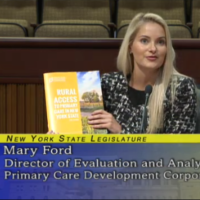PCDC Awarded Grant from Wells Fargo to Support Small Primary Care Practices in Disinvested Communities

5 Reasons Why Small Practices are Perfectly Positioned to Address Trauma

Helping Small Practices Address Adverse Childhood Experiences (ACEs)

Screening for ACEs: Q&A with PCDC’s Yael Lipton

PCDC Urges CMS to Protect New York Safety-Net Providers and 340B Savings

PCDC Testimony: Preserving New York’s Primary Care Safety Net Through COVID-19 and Beyond

Behavioral Health Integration: Q&A with PCDC’s Andrew Philip

PCDC Clinical and Quality Partners: A New Identity for Changing Times

PCDC and CHCANYS Launch COVID-19 Community Health Care Resiliency Fund to Support New York State Health Centers

PCDC Testimony: Protect Primary Care Investments in New York State

PCDC Spotlights Rural Access to Primary Care at NYS Assembly Hearing

PCDC Advocates for Primary Care at New York State FY2020 Budget Hearing
